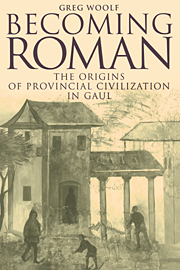Book contents
- Frontmatter
- Contents
- List of illustrations
- Preface
- Abbreviations
- Map 1 Modern regions and river names
- Map 2 Provincial boundaries c. ad 100
- Map 3 Major peoples of Roman Gaul
- 1 On Romanization
- 2 Roman power and the Gauls
- 3 The civilizing ethos
- 4 Mapping cultural change
- 5 Urbanizing the Gauls
- 6 The culture of the countryside
- 7 Consuming Rome
- 8 Keeping faith?
- 9 Being Roman in Gaul
- List of works cited
- Index
2 - Roman power and the Gauls
Published online by Cambridge University Press: 09 December 2009
- Frontmatter
- Contents
- List of illustrations
- Preface
- Abbreviations
- Map 1 Modern regions and river names
- Map 2 Provincial boundaries c. ad 100
- Map 3 Major peoples of Roman Gaul
- 1 On Romanization
- 2 Roman power and the Gauls
- 3 The civilizing ethos
- 4 Mapping cultural change
- 5 Urbanizing the Gauls
- 6 The culture of the countryside
- 7 Consuming Rome
- 8 Keeping faith?
- 9 Being Roman in Gaul
- List of works cited
- Index
Summary
Imperialisms, modern and ancient
Power is a slippery concept. A generation before Julius Caesar's conquest of the North, Vercingetorix' father was ejected by the Arverni for aiming at supreme power, and at about the same time the Aedui and the Sequani contested for supreme power in Gaul. We know little about how these conflicts were conducted or even what form supreme power or hegemony would have taken in this period. Roman rule, however, changed both in the methods of competition and in the prizes that could be won by it. This too was an aspect of Roman cultural style in Gaul. Gauls were not passive objects of Roman rule, but had been implicated by Rome in new configurations of power, new complexes of domination. In so far as a power structure existed it was constituted by the regular forms these contests took.
The career of Titus Sennius Solemnis illustrates the nature of this power structure. The inscription through which we know this third-century Gallo-Roman aristocrat originally formed part of a typical honorific monument, a statue set up in ad 238 in a public area of his home city, by decree of the senate of the free community of the Viducasses, who lived around Caen in modern Normandy, after Solemnis had been voted the honour by the Council of the Three Gallic Provinces.
- Type
- Chapter
- Information
- Becoming RomanThe Origins of Provincial Civilization in Gaul, pp. 24 - 47Publisher: Cambridge University PressPrint publication year: 1998

